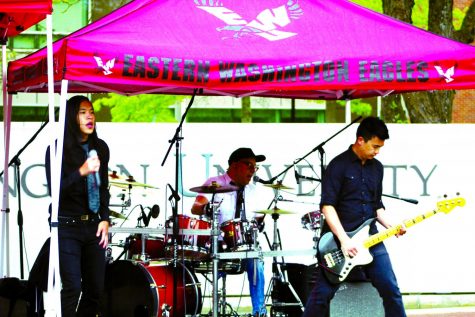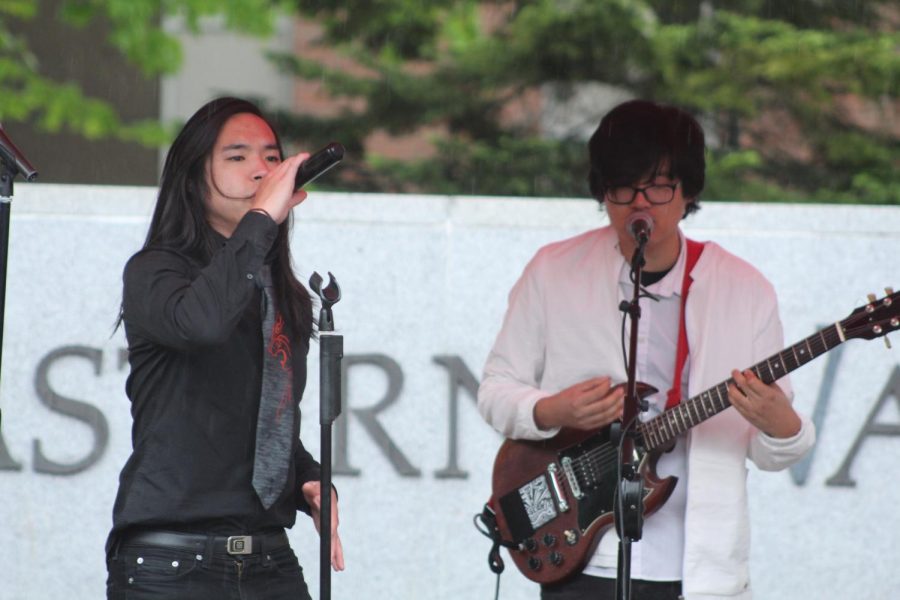Asian-American band goes from Supreme Court to EWU stage
The Slants are the first and only all-Asain American dance rock band in the world. The Slants went through a legal battle for eight ears that climbed up to the Supreme Court over patenting their band name | Photos by Mckenzie Ford for The Easterner
May 23, 2018
On May 17, dance-rock music was not the only thing the all-Asian-American band The Slants brought to the EWU Campus Mall. With the band came a backstory of struggle and persistence to transform the conversation surrounding race and racial slurs on a national level.
“There’s a picture that I really like where there are two people digging, and you see the diamonds at the end […] and one guy is just inches away from getting to the diamonds, and he walks away. But the guy under him is still gonna keep digging until he gets that diamond,” The Slants singer Ken Shima said.
The Slants guitarist Simon Tam started the band back in 2007. Various band members have circulated since then, but Tam’s message has remained the same.
“I wanted to start a band that would provide a bold portrayal of Asian culture,” Tam said. “When people talk about being Asian-American, it’s not a racial identity, it’s a political identity. We, as Asian-Americans, use it to express ourselves and who we are in the United States, and how we function in society.”
Tam took the band’s message to the political stage in 2009 when he applied to patent the name, “The Slants,” with the U.S. Patent and Trademark Office. The name was initially denied.
“The U.S. Patent and Trademark Office said that our name was ‘disparaging to persons of Asian descent,’ so basically, we were racist towards ourselves,” Tam said.
Thus initiated an eight-year legal battle that climbed its way to the Supreme Court: on one side, a fight to reclaim a racial slur, and with that, a cultural identity. On the other, a re-examination of law and language, and who has authority over each.
On June 19, 2017, after hearing arguments from both sides, the Supreme Court unanimously agreed in Tam’s favor to allow “The Slants” to be patented.

The Slants has used its name before to embed its Asian-American cultural identity into its musical works: examples include albums such as Slanted Eyes, Slanted Hearts (2007) and Something Slanted This Way Comes (2016). But now, with the finalization of the court case, the most recent album titled The Band Who Must Not Be Named (2017) emphasizes an even stronger meaning for band members.
“Taking control of an identity has certain power, and taking control of language has power,” Tam said.
Since the court decision, the band’s members have continued to uplift its audiences —such as the EWU students dancing and cheering in the rain at the live performance last Thursday—through music, as well as continue to talk about issues around culture and race through discussions, such as the one that took place in the Showalter Auditorium following the performance.
“We are a band that is made of activists,” The Slants musician Joe X. Jiang said.
As the dig for diamonds continues for those struggling to break racial-cultural barriers, The band members are showing that with enough persistence, change in discourse and law up to the highest levels is, in fact, possible.
“Growing up, for me, I did everything just to keep my head down and just kinda mix in. Now, everything has changed for me since I joined this band,” Shima said.








